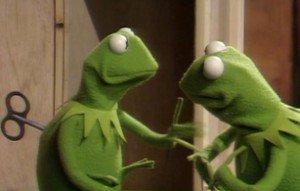The Muppet Show 1.04: “Ruth Buzzi”
Ruth Buzzi, famous at the time for being a regular on the sketch comedy show Laugh-In, is the first Muppet Show guest who seems to really jibe with the characters and the show’s sensibility (it’s no wonder she would later be a regular on Sesame Street). You can tell this right off the bat in her first song, a rendition of the classic “Can’t Take My Eyes Off of You,” which isn’t only the best musical number on the show up to this point but the best Muppet/human-guest interaction, full-stop.
The staging and concept are fantastic, constituting the first time that The Muppet Show seemed to really think entirely outside the box for a number, creating a whole mini-one-act-play between Buzzi–as a faux-medieval princess–and Sweetums, acting out a courtship that subverts fairy tale tropes left and right. Rather than an evil ogre trapping an unwilling princess in a dungeon (as Sweetums held Robin prisoner in The Frog Prince), Buzzi’s Princess is actually the one who has set her eyes on the ogre, singing of her love and literally throwing herself at him, as he continues to eat, drink, and ignore her advances, which include climbing him, tickling him, and hanging from his legs, until she finally gets to him. He starts to become so enamored himself that he gets too excited, slamming her to the ground and standing triumphantly on her chest, as if she’s a prize he’s conquered. But even though she loves him, she refuses to allow herself to be treated like an object, instead proving herself his equal by getting up, smashing a chair over his head, knocking him down with an exhale of breath, and then standing triumphantly over him herself. “That’s my kind of woman!” he says (foreshadowing a recurring line of Animal’s but in the moment underlining the dichotomy between his gruff exterior and the sweet, eager-to-please personality underneath it).
So we get a nifty feminist fairy tale rewrite that not only allows a woman to fall head over heels for a beast with no sign in sight of a curse on his ugliness being broken (in other words, outer handsomeness/beauty isn’t being used as a barometer of morality or desirability, which Disney would echo in their Beauty and the Beast years later, where the male villain is the conventionally attractive one, and Belle doesn’t only realize she loves the Beast before her transforms back into a handsome prince but even seems initially disappointed by the change), but to seize the upper hand, as well, again and again. And Buzzi throws herself into it with such abandon that she sets the bar for future Muppet Show guests in getting down and dirty with the Muppets…so to speak. That is to say she acts as if she’s a Muppet herself, not requiring the puppets around her to treat her with kid gloves nor being gentle with them, either. She grabs at Sweetums and later she tickles Kermit, just going for it, unlike the three previous guests, all of whom seemed to be at a bit of a remove from the Muppets, not always entirely sure how to physically interact with them. To be fair, this was to varying degrees–Connie Stevens and Joel Grey in particular each had some nice moments–but Buzzi actually manages to feel like she’s one of them in her best moments in the episode.
But it’s a shame that she appears this early in the run before the writers had fully found the show and the characters’ voices, because as with most of the early guests, her scenes remain mostly segregated to on-stage sketches and songs completely separate from the backstage plot, and there’s also not very much of her throughout the half-hour (it takes longer for her to appear than any of the three previous guests), making me wish we could have seen her interacting with more Muppets and using her unique energy to its best advantage.
The writing also fails her at two key points in the show, both of which seem to add up to–at least to today’s modern eyes–an unfortunately negative portrayal of her character, overall. During her chat with Kermit, her dialogue finds her oddly obsessed with weight. Kermit suggests they chew the fat, and she replies, “I never chew the fat. Fat is not good for you…You are looking at a body with not one ounce of fat on it!” And she keeps going on and on about her “lean” body, then telling a joke about a fat friend of hers who ate so much “she was as big as a house and decided to rent herself out as a duplex.” Not cool, Ruth! She then goes on about all the health foods she loves to eat and, well, it makes her come off as conceited, narcissistic, obsessed with looks, and bigoted towards plus-sized people. Then, later on, during a debate segment, Gloria Goodbody, the character she plays, is obsessed with physical fitness to the point that she begins doing yoga moves right there on the table, showing off her flexibility.
Now, I’m fully willing to give Buzzi the benefit of the doubt that this is just dated, sexist writing from an earlier era, particularly with Jack Burns rather than Jerry Juhl being the head writer in Season 1, and even that it’s possible that the two sketches’ focus on thinness are unfortunate juxtapositions rather than a reflection of Buzzi as a person, but they do conspire to make her seem like a bit of a dick, or to be kinder, someone who’s internalized society’s abuse of the not-conventionally-attractive and projected it outwards, as many do–or at least the scripted version of Ruth Buzzi that appears on the show does, and that’s really too bad since she’s so extremely talented and truly funny throughout other than that problematic element, displaying expert comic timing and genuinely infectious joy. A great example is the sketch in which she’s a POW facing inquisition at the hands of two enemy Muppet soldiers. But the moment they so much as bring up the possibility of torture, she spills the beans about everything, not only about her army’s position but personal details about various soldiers, until her captors are begging her to stop–a scene to which she brings a fantastic amount of nervous energy and amiability.
Another odd little thing about the episode is that Buzzi actually isn’t in the closing number, simply introducing the Gogolala Jubilee Jugband’s cute but ultimately-rather-underwhelming-for-a-finale “You Can’t Rollerskate in a Buffalo Herd”–the first time a human guest hasn’t taken part in the last song, although to be fair, it would have been hard to top her opening number. But then, possibly even more strangely, the episode doesn’t actually stop there, instead cutting to the aforementioned panel debate, which fits rather oddly as a final segment, further throwing off the pacing of an episode that already seemed a bit off-kilter due to how long we waited for Buzzi to appear. There are an unprecedented four on-stage songs/sketches before she shows up, not to mention two fairly long backstage scenes.
And, interestingly, while in some ways, the backstage “plot” is the best one yet, it’s also, in some ways, presented in the sloppiest manner, further underlining the structural issues with Season 1, where attention to specific detail seemed to fall by the wayside far too often. The concept is that Scooter has ordered a Mechanical Wind-Up TV Show Host, which arrives in a huge crate, for the show, and Kermit scoffs at the notion, until Scooter tells him that his uncle, who owns the theatre, approved it, at which point Kermit instantly falls in line, as he did in the first episode. Upon opening it, they discover that the robot is a dead-ringer for Kermit, the only visible difference being a wind-up crank sticking out of its back, at which point Scooter leaves and the robot advances on Kermit, backing him into the crate and closing him inside it, clearly hell-bent on taking his place (making this Kermit’s first doppelganger, a concept around which the film Muppets Most Wanted would revolve)!
But then, in the very next backstage scene, Kermit is no longer trapped and instead we get what’s almost an alternate take of the exact same scene. Kermit enters the dressing room and walks up to what he believes to be a mirror but actually has no glass. The “reflection” within it is actually the robot. Whenever Kermit moves, the robot seems to replicate his every motion, a tribute to the classic Harpo Marx scene in the film Duck Soup, later recreated on I Love Lucy. Finally, the robot reveals itself, and Kermit freaks out. He asks Scooter why it’s here, and the robot replies, “I’m a gift from his uncle,” Kermit instantly replying, “Welcome to the show.” So not only is the punchline of Kermit being upset by the robot until being reminded that Scooter’s uncle bought it exactly the same as in the previous scene but no further progress is made. In both scenes, Kermit seems surprised by the robot’s existence and presence, which makes no sense the second time around, not to mention the fact there isn’t even any scene-to-scene continuity of Kermit escaping from the crate.
Pages: 1 2



